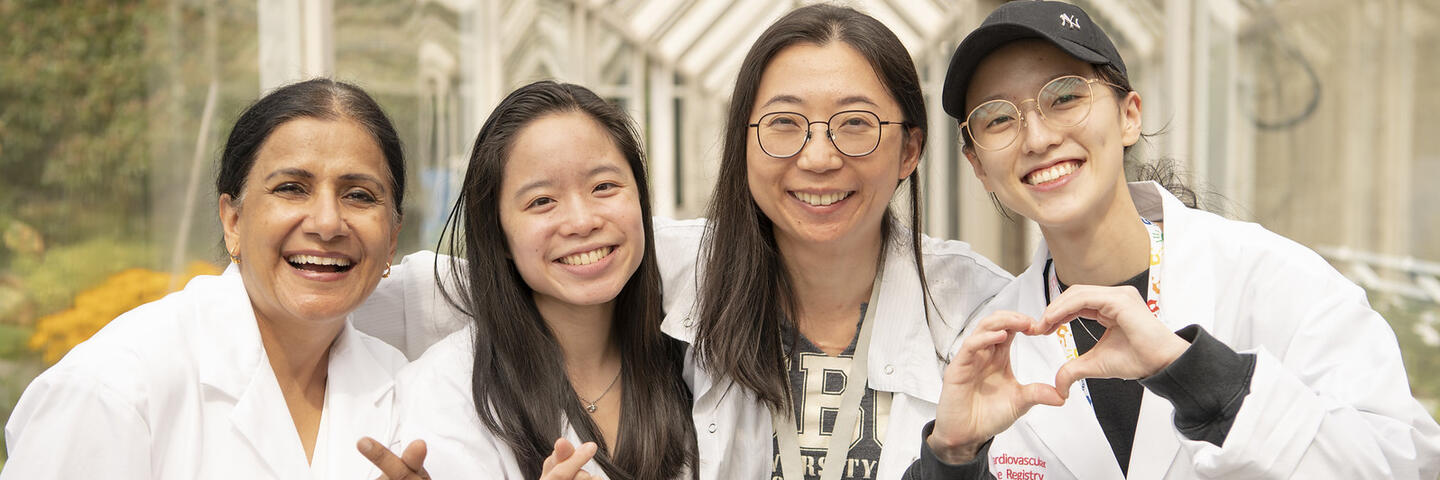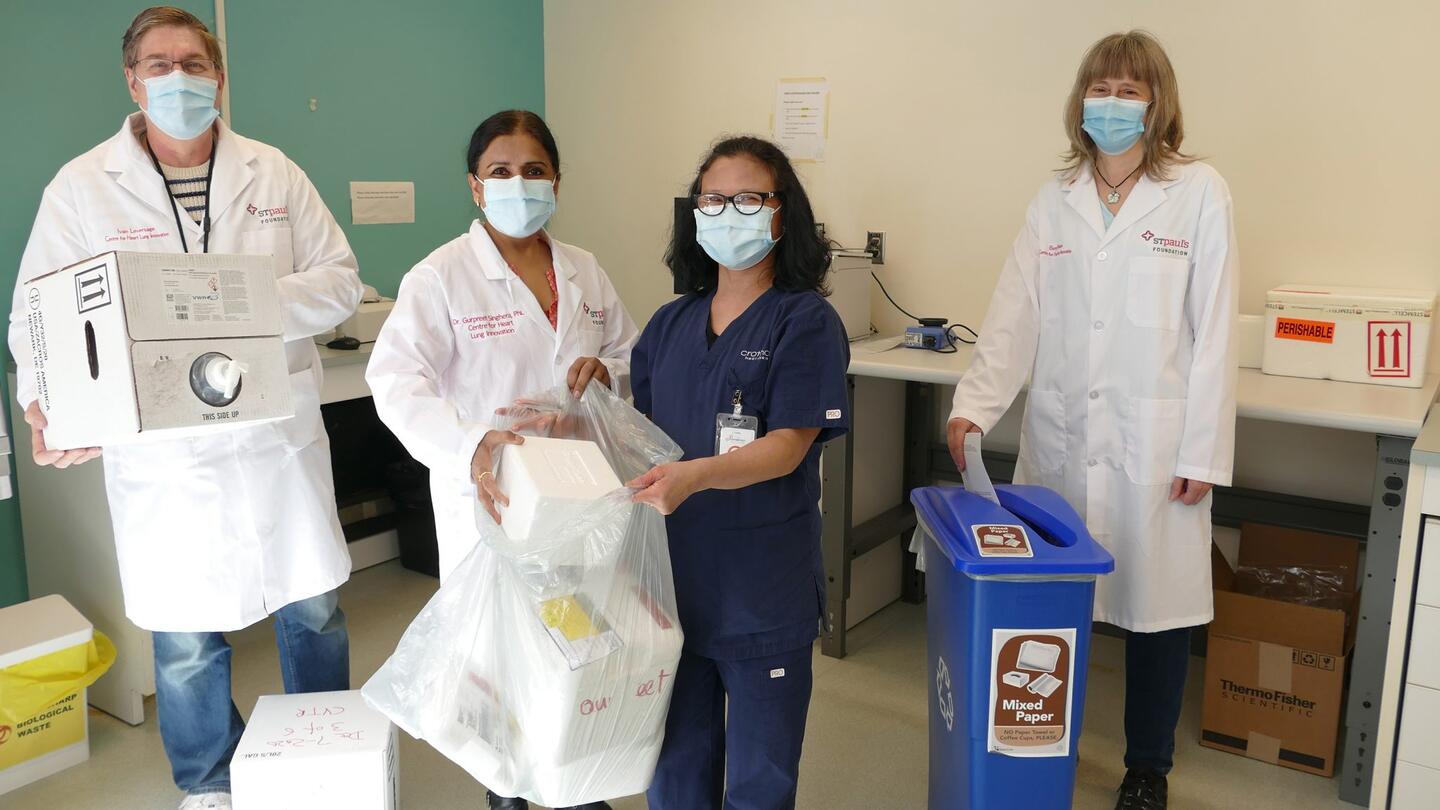HLI researcher leads sustainability efforts in biobanking and beyond
This Earth Day, we highlight Dr. Gurpreet Singhera, who is taking action to advance environmentally friendly practices within lab research and biobanking.
Biobanks Heart Innovation | Grace Jenkins

Earth Day, celebrated each year on April 22, is an opportunity for individuals and organizations to promote sustainability and encourage support for environmental protections. At Providence Research, sustainability is one of the foundational principles of our Discovery: Forward Strategic Plan. As stewards of our past, present and future, our commitment to sustainability includes both protecting the environment and preserving our capacity to contribute to the greater good, driving positive change in health care and research.
Researchers across Providence Research, our centres, and clinical academic research groups are finding innovative ways to implement sustainable practices. Among them, Dr. Gurpreet Singhera, Research Associate with the Centre for Heart Lung Innovation (HLI) and Operations Lead of the Bruce McManus Cardiovascular Biobank (BMCB), is taking action to advance environmentally friendly practices within lab research and biobanking.
Championing recycling in the lab
Since 1977, the HLI has been conducting groundbreaking research to develop innovative solutions for heart, lung, and critical care diseases. While the process of laboratory research inevitably produces a certain amount of waste, Dr. Singhera and her team have taken significant steps to reduce this and promote recycling in the HLI’s research lab. She is passionate about protecting the environment, particularly as a parent.
“I feel that it’s our duty to leave a good Earth, a good environment, to our children, and their children,” says Dr. Singhera.
As a member of the Green+Leaders program, a community of health care staff who are engaged in advancing sustainability practices within the health system, Dr. Singhera collaborated with Fraser Health to set up designated recycling bins in the HLI’s lab and office areas. This included adding proper signage to ensure that waste is sorted correctly. Dr. Singhera credits much of this initiative’s success to the help of Berlina Odchigue, the HLI’s long-time housekeeper, who has been on board with these sustainability efforts from the beginning.

L-R: Ivan Leversage, Gurpreet Singhera, Berlina Odchigue, and Beth Whalen.
Noticing plastic jugs of water were being wasted after large catered meetings, Dr. Singhera advocated for water coolers to be added to the meeting space. Now, staff refill reusable water bottles at the water cooler and are encouraged to use washable mugs for their coffee and tea instead of disposable cups.
Research labs often purchase consumable research materials, such as cell culture plates and centrifuge tubes, in bulk, to take advantage of sales and discounts. If a research group at the HLI has such materials left over after a study is completed, they will hold a free internal “garage sale”, allowing other researchers to make use of them. This is both environmentally and economically more sustainable and broadcasts the sustainability initiative to a wider research audience.
“We try to use the three ‘Rs’: recycle properly where we have to, reuse where we can, and repurpose if we can,” says Dr. Singhera.

Pioneering sustainable biobanking
Dr. Singhera is leading a particularly groundbreaking initiative to advance sustainability in biobanking at Providence Research. Biobanks are collections of biological material, including blood, tissue, and DNA, that have been donated for research. These biospecimens are essential for advancing medical research.
The BMCB, managed by Dr. Singhera and directed by Dr. Ying Wang, has one of the largest collections of explanted human hearts and heart valves in Canada. These hearts are stored in containers filled with the preservative formalin, which is a Class 1 carcinogen. While this method is effective, it generates approximately 1,668 liters of chemical waste each year, raising major safety and environmental concerns.
Ivan Leversage, HLI Safety Coordinator, ensures the proper storage of formalin waste from BMCB, along with other biohazard waste from HLI labs, until it is sent to the University of British Columbia (UBC) campus for proper disposal. His efforts help maintain a safer and more environmentally responsible workplace at HLI.
Dr. Singhera, alongside BMCB staff Coco Ng and Tiffany Chang, received a grant from the UBC Green Labs Fund to develop a greener alternative to preserve explanted hearts. The fund aims to generate sustainable solutions to reduce the environmental impact of research activities.
The BMCB team have been testing and refining a method of vacuum-sealing heart samples as a long-term storage solution. This significantly reduces formalin waste and decreases lab workers’ exposure to formalin fumes. It additionally reduces the risk of spillage and optimizes storage space, allowing more of these vital samples to be stored in a smaller area.
“I think moving forward with this is going to be helpful for everyone,” says Dr. Singhera. She intends to write a technical paper on this method to submit for peer review, so that this can be shared with other biobanks.
Acting on sustainability at PHC and Providence Research
Dr. Singhera’s efforts to promote greener practices in lab research and biobanking align with Providence Research’s foundational principle of sustainability. When individuals, teams and organizations work together to reduce their environmental footprint, they can make a significant impact.
“Growing up with limited resources - scarce running water, electricity shortages, and heavy air pollution - has made me deeply appreciate the privilege of living in a place like Vancouver. However, with privilege comes responsibility,” says Dr. Singhera. “Growth is inevitable, but we must seek smart alternatives to actions that harm the environment. Even the smallest efforts, both at home and at work, can contribute to a greener future and help preserve what we cherish today for generations to come. We owe this to Mother Earth. I’m grateful for the support of the HLI, Providence Research, and my colleagues in this endeavor.”
Earth Day is reminder of the importance of taking action to protect our environment. There are many opportunities at Providence Research and Providence Health Care to get involved in advancing sustainability. We invite you to consider joining the PHC Environmental Stewardship Team, a cross-disciplinary group of committed staff and medical staff who take action to advance PHC’s Planetary Health Strategy towards sustainable health care, and Providence Research’s foundational principle of sustainability. You can learn more about that strategy here.
“Joining the Environmental Stewardship Team has opened my eyes to the ways we can make Providence Research greener. The IV Bag and Tubing Recycling Pilot project has inspired me to explore ways to reduce waste as we are planning the new Clinical Trials Unit at Mount Saint Joseph Hospital,” says Josephine Jung, Director, Special Projects and Strategy, Providence Research.
Additionally, an Orientation to Sustainable Health Systems e-learning course is available to PHC staff on LearningHub. This 30-minute introduction is designed to deepen your understanding of the impacts of climate change on health and the health care system. You can find further educational resources on sustainability and health care at CASCADES Canada and Choosing Wisely Canada.
On April 22, we celebrate the hard work of Dr. Singhera and her team, who are making a difference not only here at Providence, but for our planet.